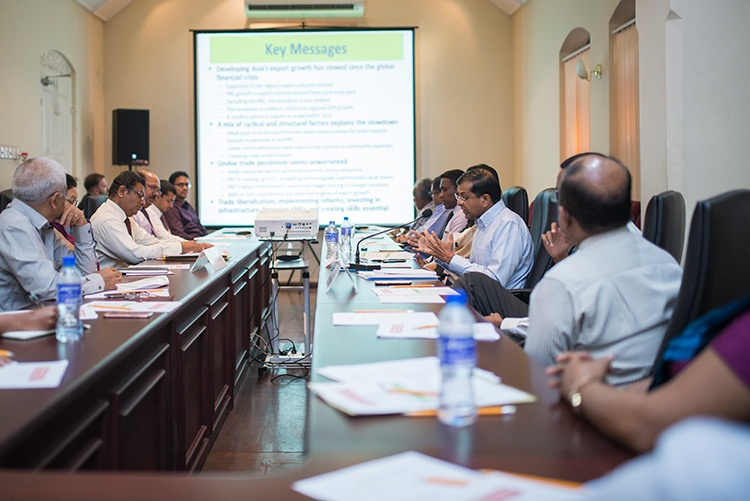Takeaways – Ganeshan Wignaraja on Asia’s Trade Slowdown
February 27, 2017 Reading Time: 3 minutes

Reading Time: 3 min read
Introduction
- Dr. Ganeshan Wignaraja, Advisor in the Office of the Chief Economist of the Asian Development Bank (ADB) in Manila, addressed a Foreign Policy Round Table at LKI on “Asia’s Trade Slowdown and what it means for Sri Lanka”, on 10th January 2017.
- The round table was attended by leading policymakers and experts, including the Hon. Deputy Minister of Foreign Affairs, Dr. Harsha de Silva, and senior officers of the Ministries of Finance, National Policy and Economic Affairs, Industry and Commerce, Development Strategies and International Trade, and from the Board of Investment and Department of Commerce. Representatives from the ADB, the Harvard Center for Development, and leading think tanks and private sector companies also participated.
Key Takeaways
Dr. Wignaraja presented a detailed examination of the dynamics of trade and global value chains in Asia since the global financial crisis; comparing patterns of trade during pre and post-crisis periods, with a focus on export growth during these periods. He mapped and explained the export slowdown, and considered how the dynamics may affect Sri Lanka, including new opportunities in trade. The following are some highlights:
- The average growth of developing Asia’s exports has declined from 11.2% in 2001-2010, to 4.7% in 2011-2015. This reflects a fragile, post financial crisis environment, of weak import demand in advanced economies, moderating growth and rebalancing in China, and a rise in protectionism.
- Sri Lanka’s average annual growth rate of exports increased slightly from 1.5% in 2001-2010 to 2.7% in 2011-2015. This is still half the average for developing Asian countries, indicating Sri Lanka’s catch-up potential with other economies in Asia and particularly with East Asian economies.
- China is entering a new phase of technology-led export growth that plugs into regional value chains in East Asia. The migration of these labor-intensive global value chain (GVC) stages to other countries in the region presents an opportunity for Sri Lankan firms to engage in industries ranging from textiles to electronics.
- SMEs are crucial in GVCs, both as direct and indirect exporters. Promotion of this sector is therefore essential. This can be done via several measures, including:
- Prioritising the financing of SMEs, by special loan schemes and other means;
- Improving financial literacy;
- Addressing language barriers (especially English) to ensure that SMEs have access to GVCs;
- Forming SME clusters along with required incentives and infrastructure facilities.
- Sri Lanka’s exports are limited to a few products and services such as textiles, tea, tourism and BPOs. Sri Lanka should rapidly diversify and widen its export base and particularly increase the share of services in its exports.
- Labor productivity in Sri Lanka is currently only 25% of U.S. labor productivity. Structural reforms are required to increase this, as higher labour productivity is crucial to increasing the quality and quantity of products.
- Required reforms would include labour market reforms, upgrading of tertiary-level engineering skills, and investing in physical and digital infrastructure.
- Protectionist pressures should be avoided, and the benefits of an open economy should be maximized as follows:
- Reducing import tariffs and improving surveillance of non-tariff measures;
- Improving the investment climate and promoting good regulatory practices;
- Ratifying the WTO’s Trade Facilitation Agreement to reduce trade costs;
- Engaging with mega FTAs, like the Regional Comprehensive Economic Partnership (RCEP), for new markets.
Click here to listen to Dr. Wignaraja’s presentation.
Suggested Further Reference Material
Wignaraja G., Zhuang J., Mariasingham M.J., Dumaua-Cabauatan M. (2017). Changing Patterns of Trade and Global Value Chains in Postcrisis Asia . Asian Development Bank.
Hong, G.H., Lee, J., Liao W., and Seneviratne, D. (2016). China and Asia in Global Trade Slowdown. International Monetary Fund.
Jaipragas, B. (2017). As Trump kills the TPP, can China-backed RCEP fill the gap?. This Week in Asia, South China Morning Post.
Hewage, K. (2017). Sri Lanka and the Pivot to Asia in the New Global Order. Talking Economics. Institute of Policy Studies, Sri Lanka.
Wijayasiri, J. (2016). Trade is Not Just for Big Businesses: Role of Sri Lankan SMEs in Trade. Talking Economics.Institute of Policy Studies, Sri Lanka.
Daily News. (2017). Prof. Hausmann delves on need to reaccelerate Sri Lanka’s economy.
Ministry of Development Strategies and International Trade Sri Lanka. (2017). Prof. Ricardo Hausmann Guest Lecture (Playlist of recordings on youtube.com).
